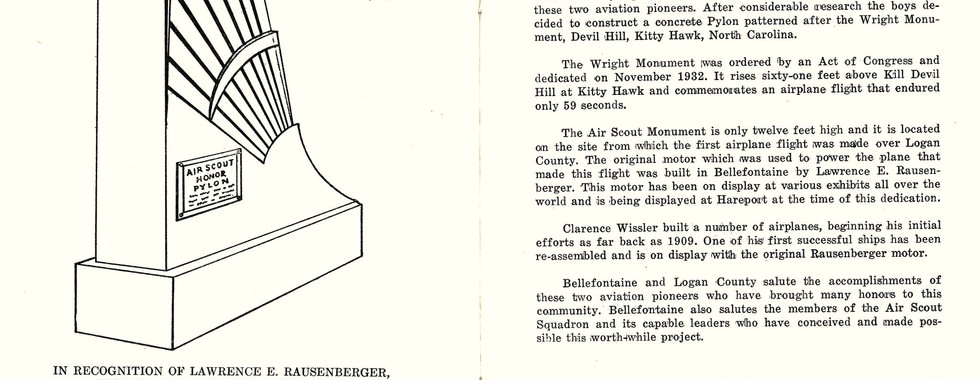Larence Rausenberger and his twin sister, Leona, were born to Andrew and Mary Rausenberger on on a farm near DeGraff in 1887. From an early age, Rausenberger was interested in machines and how they worked. His fascination with flying started when he was eight years old after he heard a man in a country store say “I read where a man invented wings, to fit a man, so he could fly, which sold for ten dollars.”
Rausenberger’s favorite area of the farm was his father’s blacksmith shop, and he also enjoyed working on farm machinery. He restored an abandoned steam operated traction machine that was used to pull a thresher through the fields. After cleaning and repairing the machine, he drove it around the farm. Another of his projects was reconditioning an old gasoline engine that he repaired and used a tin can filled with gauze for the carburetor. He hooked the engine to the water well and on days the windmill wasn’t turning, the engine pumped the water.
In April 1900, Andrew Rausenberger passed away. The family remained at the farm for another four years. During that time, the twins continued their education at the DeGraff school. After attending high school, Rausenberger took correspondence courses in mechanical engineering. He designed his first single-cylinder, air cooled, gasoline engine and sold it to a man from Indian Lake who used it on his power boat for many years. Rausenberger bought his first automobile in 1905, a “curved dash Oldsmobile” with seven horsepower.
From 1906 to 1909, Rausenberger worked at several different companies, the Stoddard Dayton Co., Pennsylvania Automobile Co., J.M. Quimby Co. in New Jersey, and the Society of Automobile Engineers in New York City. In January 1909, he returned to Bellefontaine.
Rausenberger built his first airplane engine, a liquid cooled, 45 horsepower, V-8 at his workshop in Bellefontaine in 1910. Rausenberger’s 75 hp V-8 engine was used in the first plane to fly in Logan County in 1912. The Red Devil Biplane, piloted by George Schmitt, took off from Carter’s Field, later known as Hareport, in Bellefontaine and flew over the Logan County Fairgrounds giving all in attendance the first airshow in the county. The same engine also powered the first airmail flight in Ohio.
Larence Rausenberger soon became very well-known and respected in the a
viation field for his engines. In 1912, he built the first V-12 engine in the United States. The Wright Brothers used a Rausenberger V-8 engine in the Wright Modified “B” Flyer. Rausenberger traveled all over the world to demonstrate, promote and sell his innovative airplane engines.
Rausenberger also built some of the most durable and efficient airplane engines in the first half of the 20th century. In 1914, he traveled to South America where he saw one of his engines used in the first flight over the Andes Mountains.
Larence Rausenberger continued to contribute to the aviation world when he became an aeronautical engineer at the Steel Products Engineering Co. in Springfield, Ohio. Rausenberger worked at this company as a Chief Aeronautical Engineer from 1918 until his retirement in 1957.
In 1919, the Rausie E-6, an in-line, 6-cylinder, liquid cooled 175 hp engine, was developed at Steel Products Engineering Co. by Rausenberger. It was block tested at McCook Field in Dayton where it broke the world record for oil and fuel consumption after a 50-hour full throttle endurance test.
The National Museum of the U.S. Air Force in Dayton has a Wright brothers “B” flyer with a Rausenberger 8 cylinder, 75 hp engine on exhibit. They also have a Rausie E-6 in storage.
Another Rausenberger engine has been exhibited at the Smithsonian Institution in Washington, D.C. Rausenberger considered his masterpiece engine to be a 12-cylinder 450 hp pursuit engine he designed for the U.S. Navy.
On August 1, 1948, Larence Rausenberger and Clarence Wissler, a fellow Logan County native that designed and built airplanes, were honored at Hareport in Bellefontaine at a memorial pylon dedication ceremony. The pylon is now at the Bellefontaine Regional Airport.
Larence Rausenberger passed away in 1980. “Rausie” as he was known to his friends, left an important legacy in the development and history of aviation.



























Comments